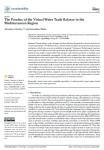Gkatsikos A., Mattas K. (2021). The paradox of the virtual water trade balance in the mediterranean region. Sustainability, 01/03/2021, vol. 13, n. 5, p. 1-14.
https://doi.org/10.3390/su13052978
https://doi.org/10.3390/su13052978
| Titre : | The paradox of the virtual water trade balance in the mediterranean region (2021) |
| Auteurs : | A. Gkatsikos ; K. Mattas |
| Type de document : | Article |
| Dans : | Sustainability (vol. 13, n. 5, March 2021) |
| Article en page(s) : | p. 1-14 |
| Langues : | Anglais |
| Langues du résumé : | Anglais |
| Catégories : |
Catégories principales 07 - ENVIRONNEMENT ; 7.3 - Eau. Gestion de l'EauThésaurus IAMM EAU VIRTUELLE ; COMMERCE ; DURABILITE ; AGRICULTURE PERIURBAINE ; EAU DISPONIBLE ; RESSOURCE EN EAU ; RESILIENCE ; INDUSTRIE ALIMENTAIRE ; GESTION DES EAUX ; UTILISATION DE L'EAU ; STOCKAGE D'EAU ; AGRICULTURE ; REGION MEDITERRANEENNE |
| Résumé : | Climate change, water shortages and desertification threaten the economic and environmental sustainability in the Mediterranean. Limited rainfall and higher temperatures put agricultural production, which relies on water availability, in jeopardy. Thereupon, Mediterranean countries pursue agri-food resilience and water preservation through efficient water policies. Hence, water-deprived areas ought to import rather than produce water-intensive products to maintain water inventories and sustainability consequently. As this study examines the water sustainability for a Mediterranean water-scarce region with a particular focus on agriculture, the virtual water trade balance explores this hypothesis. A regional input–output model is constructed, and then total water consumption and the virtual water flows for each economic sector are estimated to determine the virtual water trade balance of the economy. Results indicate that the study area has a trade deficit and struggles economically but is a net importer of virtual water and secures water sustainability. As this virtual water deficit relies heavily on agriculture and originates in vast total water consumption rather than a large trade deficit, a paradox occurs; water-intensive cultivations and animals that consume 91.75% of water resources end up appearing to be water-saving. Further research is needed to strike a balance between economic growth and environmental protection. |
| Cote : | En ligne |
| URL / DOI : | https://doi.org/10.3390/su13052978 |







